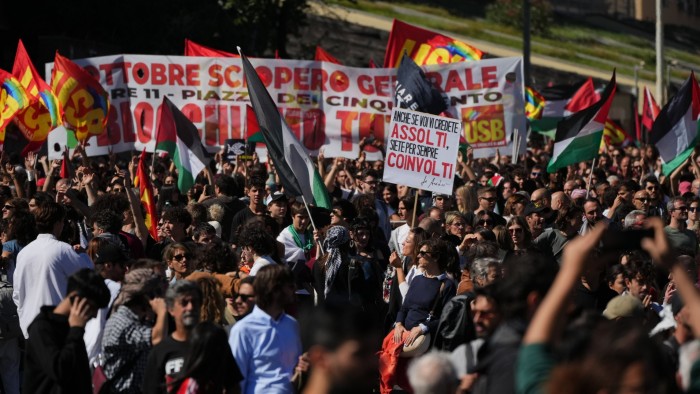Unlock the Editor’s Digest for free
Roula Khalaf, Editor of the FT, selects her favourite stories in this weekly newsletter.
Italy has been severely disrupted by a nationwide general strike called in solidarity with the Palestinian people, dialling up the pressure on Prime Minister Giorgia Meloni’s response to the humanitarian crisis unfolding in Gaza.
The strike — called by Italy’s influential trade unions and declared illegal by authorities — affected public transport, schools, railways and ports, as protesters demanded an end to Israel’s Gaza offensive.
Tens of thousands of people marched through Rome and other cities, while small groups of protesters skirmished with police in several places. In Turin, protesters rushed on to an airport runway — briefly forcing its closure — and ransacked a conference venue.
“Revolutions and long weekends don’t go together,” Meloni told reporters before the strike began. “I still believe that all this brings no benefit to the Palestinian people. On the other hand, I understand that it will cause a lot of hardship to the Italian people.”
The strike comes after Israel’s military intercepted a flotilla of some 45 ships carrying humanitarian aid for Gaza, and arrested the activists on board, including 40 Italians, some of whom were opposition lawmakers.
Meloni had criticised the flotilla as a media stunt that risked scuppering US President Donald Trump’s efforts to end the conflict in Gaza with his new peace plan.
Small, pro-Palestinian protests have taken place in other European cities too since the interception of the aid flotilla, including in Geneva, Paris and cities in Spain.
Italy’s second general strike in two weeks reflects Meloni’s difficult balancing act, as she confronts the widespread public outrage over Gaza’s plight, while trying to remain in sync with Trump, a strong backer of Israel, said Daniele Albertazzi, a political scientist with the University of Surrey.
“Meloni is in a bit of a bind,” Albertazzi said. “I don’t think she can ignore the weight of public opinion, and these deep-seated feelings towards Palestinians, and the way the war has been conducted.” But, he added, “she wants Italy’s position to be as pro-Israel as possible in the circumstances”.
This summer, a survey conducted by Youtrend, a leading political pollster, found about 63 per cent of Italians believe Israel is carrying out a genocide in Gaza, and that innocent civilians are the main casualties of Israel’s offensive against Hamas.
Meloni is increasingly isolated in Europe after France, the UK, Spain and others recognised Palestinian statehood. “She can make clear critical statements — and she has done — but ultimately, is she putting pressure on Israel alongside others? She is not,” Albertazzi said.
The premier said last week that recognising Palestinian statehood “in the absence of a state that has requisite sovereignty, does not resolve the problem” because “it does not provide tangible, concrete results for the Palestinians”.
However, Meloni said Rome would take that step if Hamas hands over all remaining Israeli hostages, and is excluded from any future government.
Initially a strong supporter of Benjamin Netanyahu, Meloni has grown critical of his tactics, calling Israel’s offensive in Gaza unjustifiable and disproportionate. Yet Rome has taken few steps to pressure Netanyahu’s government to change course.
Israel has denied that its military has been involved in war crimes in the besieged enclave, claiming that Hamas hides fighters and weapons behind civilian infrastructure.
Democratic party leader Elly Schlein, who joined the protest in Rome on Friday, slammed Meloni’s approach, saying the premier had used “harsher words and harsher attacks against the activists of the flotilla than she ever had for Netanyahu’s crimes in Gaza and the West Bank”.
But Albertazzi said Meloni was unlikely to change tack: “She will not want to be seen as backing down in the face of the strikes. Italy is staying alongside the United States and waiting for the US to act.”
Additional reporting by Giuliana Ricozzi

